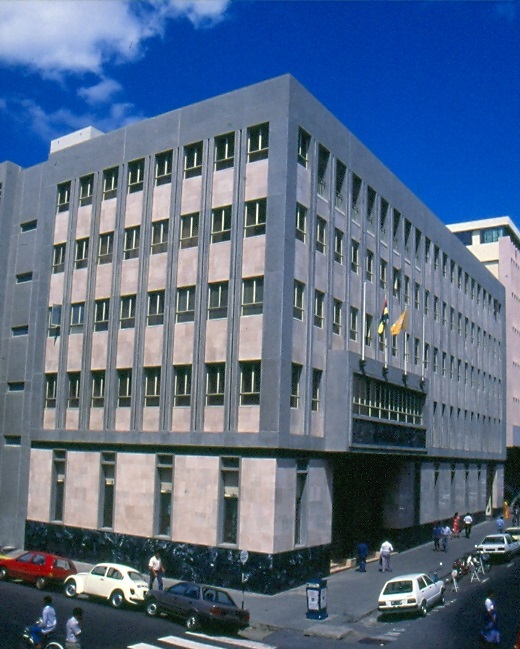Establishment
The Bank of Mauritius was established in September 1967 as the central bank of Mauritius. It was modelled on the Bank of England and was, in effect, set up with the assistance of senior officers of the Bank of England.
The then Premier and Minister of Finance, Sir Seewoosagur Ramgoolam, in his inaugural speech, stated that “the time, however, had come for a rather more modern and sophisticated organisation to look after the broader technical aspects of our monetary affairs. It was logical, therefore, that a central bank should be established.”
The Bank of Mauritius was conceived along the line of the well-known Radcliffe Report as “a separate organisation with a life of its own, capable of generating advice, views and proposals that are something more than a mere implementation of its superior's instructions.”
Board of Commissioners of Currency

Before the establishment of the Bank of Mauritius, the currency issue was managed by a Board of Commissioners of Currency – the first of its kind to be set up in the world. The duties of the Board were restricted to those of an issuing authority.
The setting up of the Bank of Mauritius marked the beginning of a new phase in the monetary history of Mauritius, with the monetary system moving forward from the stage of Sterling Exchange Standard, under which currency was issued in exchange for sterling at a fixed rate of exchange, to that of a managed currency in which the discretionary role of the monetary authority becomes important.
Objectives of the Bank
Initially, under the Bank of Mauritius Act 1966, the purposes of the Bank of Mauritius were to “safeguard the internal and external value of the currency of Mauritius and its internal convertibility' and to 'direct its policy towards achieving monetary conditions conducive to strengthening the economic activity and prosperity of Mauritius.” The Bank of Mauritius Act 1966 was repealed with the enactment of a new Bank of Mauritius Act in 2004. The main purpose of the Bank of Mauritius in that Act evolved to that of maintaining price stability and promoting the orderly and balanced economic development of Mauritius.
The Bank of Mauritius is also responsible for the formulation and execution of monetary policy consistent with stable price conditions. There is a Monetary Policy Committee which formulates and determines the monetary policy. This committee sits under the chairmanship of the Governor.
Besides its primary objective, the Bank of Mauritius also has the responsibility to ensure the stability and soundness of the financial system of Mauritius as well as the regulation of credit and currency in the best interests of the economic development of Mauritius.
The Bank of Mauritius is independent. Its Board is not subject to the direction or control of any other person or authority. The Bank of Mauritius has to be transparent in the conduct of its operations and has also to act equitably and uniformly and in accordance with sound administrative principles.
Functions of the Bank of Mauritius
The functions of the Bank of Mauritius are directed towards the achievement of its statutory objectives. In particular, the Bank is entrusted, inter alia, with the responsibilities to:
- conduct monetary policy and manage the exchange rate of the rupee, taking into account the orderly and balanced economic development of Mauritius
- regulate and supervise financial institutions under its purview, namely banks, non-bank deposit taking institutions, and money changers and foreign exchange dealers
- issue currency
- act as banker to the Government and to banks
- manage the clearing, payment and settlement systems of Mauritius
- manage the foreign exchange reserves of Mauritius
- collect, compile and disseminate monetary and related financial statistics
- advise the Government on financial matters
- promote public understanding of the financial system and
- maintain the Mauritius Credit Information Bureau.
The effectiveness of the role and functions of central banks in achieving the desired results depends greatly on the extent to which monetary policy and fiscal policy are co-ordinated.

The Banking Act 2004 is the enabling legislation for all financial institutions falling under the purview of the Bank of Mauritius. As such, banks in Mauritius are regulated and supervised by the Bank of Mauritius under the Banking Act 2004. The Bank of Mauritius endeavours to strengthen and modernise the regulatory and supervisory regime in order to maintain financial stability. It establishes prudential norms which are required to be applied to banks and other regulatees in line with international standards.
The Banking Act 2004 was amended in December 2007 and 2010 to enable the Bank to issue specialised licences to banks wishing to carry on any or all of the following: banking business, Islamic banking business, private banking business and investment banking business. The basic objectives of the Banking Act 2004 are to maintain a sound banking system in Mauritius and to protect the interests of depositors.
It incorporates the following general principles of prudential regulation and supervision of licensed financial institutions:
- Licensing of banks and other financial institutions
- Issuance of guidelines to financial institutions
- Capital structure and requirements
- Quality of management, including responsibilities of directors and other officers
- Liquidity management
- Electronic banking
- Limitation on operations
- On-site Examinations and off-site Surveillance
- Role of External Auditors
- Compliance with Anti-Money Laundering/Combatting the Financing of Terrorism (AML/CFT)
- Conservatorship, voluntary and compulsory liquidation of financial institutions
Banks, like any other private enterprise, are profit maximisers. In the pursuit of profit-making, they may become less cautious and take greater risk in their lending operations. This may endanger the safety of depositors' money. From the supervisory angle, one of the most important concerns of the Bank of Mauritius is therefore to ensure the maintenance of a sound banking system in order to sustain stability in the financial system. As part of its functions, the Bank of Mauritius is thus required to ensure:
- the promotion of adequate and reasonable services to the public,
- a high standard of conduct and management throughout the banking system, and
- the pursuit of such policies as may be in the national interest.
The Bank of Mauritius hosts the Mauritius Credit Information Bureau (MCIB). The MCIB operates towards the furtherance of a sound credit information system in Mauritius and allows banks to give quality loans, which in the long term has an effect on the level of non-performing loans at national level. In addition to banks and leasing companies, the coverage of the MCIB was broadened over the years to include insurance companies, utility companies as well as some other key operators in the financial sector.

Since the establishment of the Bank of Mauritius, the Mauritian economy and the financial landscape of Mauritius have undergone considerable changes. Exchange control was abolished in July 1994, after Mauritius adopted the obligations of Article VIII of the Articles of Agreement of the International Monetary Fund in September 1993. The exchange rate of the Rupee is since determined by market forces. Interest rates are freely determined on the market. Direct credit control, which served its purpose in the old days, is no longer an instrument of monetary control.
In short, the Bank of Mauritius has moved away from a system of direct monetary control to an indirect method of monetary control. The functions of monetary management and the regulatory as well as the supervisory role of the Bank of Mauritius are intertwined, more so as the country has been increasingly integrated with the world economy.
Against this backdrop of changes within the Mauritian financial system as well as those in the world financial system, the conduct of monetary policy and the regulatory and supervisory role of the Bank of Mauritius have become increasingly complex. The Bank of Mauritius is strongly committed to enhancing competition and efficiency in the financial system and ensuring its total integrity.
The Bank of Mauritius continues to take whatever steps required to safeguard the interests of depositors, preserve the reputation of Mauritius as a safe and transparent jurisdiction, and achieve monetary and financial stability.


 Since the establishment of the Bank of Mauritius, the Mauritian economy and the financial landscape of Mauritius have undergone considerable changes. Exchange control was abolished in July 1994, after Mauritius adopted the obligations of Article VIII of the Articles of Agreement of the International Monetary Fund in September 1993. The exchange rate of the Rupee is since determined by market forces. Interest rates are freely determined on the market. Direct credit control, which served its purpose in the old days, is no longer an instrument of monetary control.
Since the establishment of the Bank of Mauritius, the Mauritian economy and the financial landscape of Mauritius have undergone considerable changes. Exchange control was abolished in July 1994, after Mauritius adopted the obligations of Article VIII of the Articles of Agreement of the International Monetary Fund in September 1993. The exchange rate of the Rupee is since determined by market forces. Interest rates are freely determined on the market. Direct credit control, which served its purpose in the old days, is no longer an instrument of monetary control.